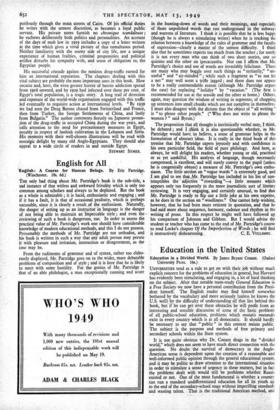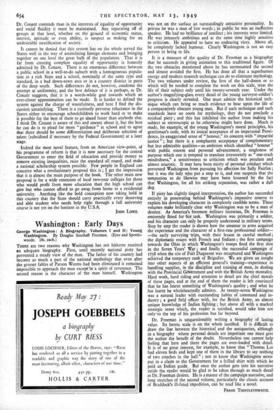Education in the United States
UNIVERSITIES tend as a rule to get on with their job without much explicit concern for the problems of education in general, but Harvard has evidently been stimulating, and engaging in, a lot of hard thinking on the subject. After that notable team-study General Education in a Free Society we now have a personal contribution from the Presi- dent himself. The English reader may find himself somewhat bothered by the vocabulary and more seriously (unless he knows the U.S. well) by the difficulty of understanding all that lies behind this book, but if he can get over these obstacles he will profit from an interesting and sensible discussion of some of the basic problem of all public-school education, problems which mutatis mutandis exist in every country which is at all democratic. It should hardly be necessary to say that " public " in this context means public. The subject is the purpose and methods of free primary and secondary schools within the State system.
It is not quite obvious why Dr. Conant drags in the "divided world," which does not seem to have much direct connection with the question. No doubt the survival of democracy in the Anglo- American sense is dependent upon the creation of a reasonable and well-informed public opinion through the general educational system, and it may be politic to draw attention to the international situation in order to stimulate a sense of urgency in these matters, but in fact the problems dealt with would still be problems whether Russia existed or not. One of the most fundamental is whether a country can run a standard undifferentiated education for all its youth up to the end of the secondary-school stage without imperilling standards and wasting talent. That is the traditional American method, and
Dr. Conant contends than in the interests of equality of opportunity and social fluidity it must be maintained. Any separating off of groups at that level, whether on the ground of economic status, interest, aptitude or even ability, is suspect as making for an undesirable stratification of society.
It cannot be denied that this system has on the whole served the States well in the way of assimilating foreign elements and bringing together on one level the great bulk of the population. That it is far from creating complete equality of opportunity is honestly admitted by Dr. Conant. There is an enormous difference between a public school in a well-to-do suburb with a homogeneous popula- tion in a rich State and a school, nominally of the same type and standard, in a bad down-town area or in a country district in parts of the deep south. Such differences do not, however, condemn the attempt at uniformity, and the best defence of it is' perhaps, as Dr. Conant suggests, that it is a worth-while goal towards which an ever-closer approximation can be made. It is harder to defend the system against the charge of wastefulness, and here I find the dis- cussion unsatisfying. There is a curiously perverse reluctance in the States either to encourage schoolchildren to work hard or to make it possible for the best of them to go ahead faster than anybody else. I think Dr. Conant is aware of this and uneasy about it, but the best he can do is to plead for more " guidance " at school and to agree that there should be some differentiation and deliberate selection of talent (subsidised if necessary by the Federal Government) at a later stage.
Indeed the most novel feature, from an American .view-point, of Ms programme of reform is that it is now necessary for the central Government to enter the field of education and provide money to remove existing inequalities, raise the standard all round, and make a national scholarship system possible. Fe* people in England can conceive what a revolutionary proposal this is ; I get the impression that it is almost the main purpose of the book. The other main new proposal is for a wide extension of local two-year colleges for those who would profit from more education than the -high school can give but who cannot afford to go away from home to a residential university. Anything like the bold conception now taking hold in this country that the State should carry practically every deserving and able student who needs help right through a full university course is not yet on the horizon in the U.S.A. JoHN LOWE.







































 Previous page
Previous page